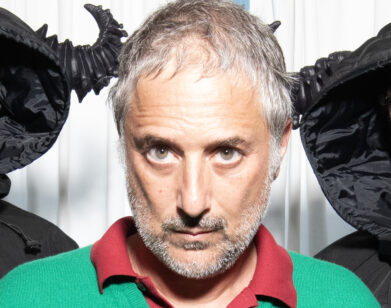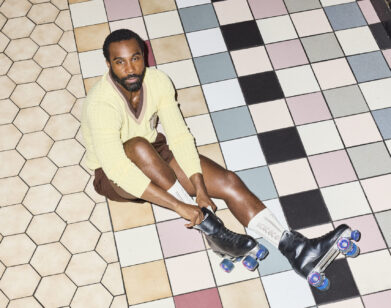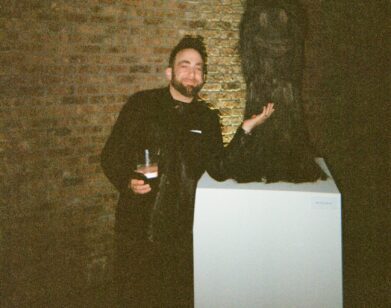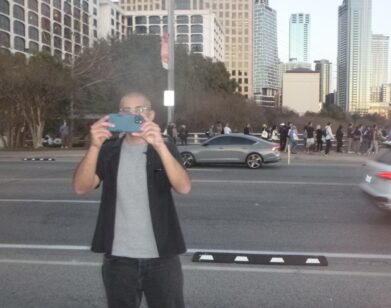Ben Barnes and the Founding Fathers
ABOVE: BEN BARNES AT THE LINE HOTEL IN LOS ANGELES, DECEMBER 2014. PHOTOGRAPHY: GUY LOWNDES. STYLING: KEEGAN SINGH/ STREETERS. GROOMING: DANIELE PIERSONS FOR EXCLUSIVE ARTISTS MANAGEMENT USING ORIBE HAIR CARE. STYLING ASSISTANT: VICKKI ACUNA. SPECIAL THANKS: THE LINE HOTEL.
“You think someone is going to ask you about the American Revolution, and then they start talking about dragons,” laughs Ben Barnes. The British actor is sitting on his sofa in Los Angeles doing a day of press. It’s a busy winter for Barnes: in December, he released By the Gun, a thriller set amongst the Boston mafia; this weekend, he will star as Samuel Adams in the History Channel’s American Revolution miniseries Sons of Liberty. On February 6, Universal will release Seventh Son, a blockbuster fantasy film with Jeff Bridges, Julianne Moore, and Kit Harington.
Now 33, Barnes became a leading man seven years ago when he was cast as Prince Caspian in The Chronicles of Narnia series. After Caspian, he played another famous literary character: the eternally handsome Dorian Gray in Oscar Wilde’s homoerotic thriller. He was in good company—Colin Firth and Ben Chaplin both co-starred in the film—but it didn’t quite live up to the success of Narnia.
EMMA BROWN: How much did you know about the American Revolution? I grew up in London and I knew very little about it. It’s not something you really learn about in school.
BEN BARNES: I also knew very little about it. Obviously you hear about these characters; you know about George Washington and Benjamin Franklin and John Hancock—your John Hancock. But if I’m being really honest, I didn’t know they were all alive at the same time. Three of them became president, and several of them are on different dollar bills, and you think, “Well, they can’t all have been working towards the same goals at the same time.” And they were. For me, it was really exciting reading the script because I didn’t even really know how or where the story was going, which might have come across as quite ignorant. But I think that’s part of the reason I was so excited to do it.
BROWN: Were you always going to be Sam Adams?
BARNES: Yes. It was something that was offered to me. The script was sent to me saying, “Do you want to play Sam Adams?” And I read through it and thought, “This character is really great! He’s such a bad ass! He’s so interesting—going from being drunk in a pub, being chased for defaulting on other peoples’ taxes, to giving a speech in the Philadelphia State House as a kind of precursor to the Declaration of Independence.” I thought, “What a wild journey for a character.” I had all sorts of ideas about how I wanted him to come across even before I’d read a word about how he actually was, and I felt like I could infuse him with that, because, you know, who remembers?
BROWN: So did you approach him as an entirely fictional character? Or did you change your ideas about him a bit once you read accounts from the time?
BARNES: I sombered him up a little bit once I read that he’d grown up around the clergy and that was his other potential path in life. You read little things, which change the details of how you want him to come across, but it wasn’t anything major because you’re still playing the words in the script, rather than anything real. I can’t watch footage of him. I can’t hear how he sounded. But you can pickup little things, which are exciting to toy with when you’re painting the character.
BROWN: Have people been protective of his image: “You better not mess up Sam Adams”?
BARNES: Not really, I think that people are used to it being toyed with. The Sam Adams beer was invented in 1984; people think it’s this beer that’s been around since the 1700s.
BROWN: Henry Thomas plays John Adams in the series. Did you watch E.T. when you were little?
BARNES: I totally did, no one else has mentioned that today. When we were sitting at the bar in Romania where we filmed it I watched Henry’s audition online for E.T. You’re sitting in front of this man, he’s a fully grown man with children of his own now, he’s got a little boy who is very like Elliott. He’s so sweet! And you’re sitting across from this man, drinking a beer, and then you’re watching his audition tape for E.T. It’s quite thrilling actually!
BROWN: At what point does that come up in conversation?
BARNES: You’ve got to leave it a couple of weeks until you get to know the person. You’ve got to bite your tongue and not mention it for a bit because it’s protocol. And then you have to find a way in that’s a bit different. You can’t just be like, “So, how was doing E.T.?” You have to wait for a moment in conversation where it comes up—you’ve got to wait for it to come up casually and organically, which is very frustrating. But it comes up eventually.
BROWN: Does he hang his head slightly and go into autopilot while he tells you the story?
BARNES: No, he was very sweet! He was a really genuine guy talking about Spielberg—it’s great! He’s obviously had a great career since then and worked with a lot of great people. But it’s a good story. An actor is a storyteller—actors like telling stories.
BROWN: Did you know any of the other actors before you started filming?
BARNES: No, I didn’t know any of them. One actor [Billy Carter] came in for about two days to play Thomas Jefferson who I’d done a play with before, but none of the main cast. I’d seen a lot of them in different programs. I’m a huge Breaking Bad fan, so to have Dean Norris come in and play Benjamin Franklin…when he put on the little spectacles and the wig, that was a pretty great moment. It’s like watching Hank play dress up. And Rafe Spall, the other Brit who played John Hanckock, I’d seen in a few things. I’d seen him in plays and I knew he was great. As soon as I knew he was doing it, which was as soon as I got the script, I thought, “This is definitely a classy project.” He always seems to choose great things.
BROWN: You filmed Seventh Son quite a while ago, right?
BARNES: Yeah, it was about three years ago now. It’s one of those big behemoth films, which requires time for CGI and 3D-ifying and all that business. But then the studio that it was with changed hands, and they had their slate for the year already set, so we had to wait a full year before they could even re-slate the film. So that’s why it’s taken so long, which was a bit frustrating, but it’s just the way things work sometimes.
BROWN: Do you feel like the same person when you watch it, or is it a bit, “Oh, I look so young there”?
BARNES: It does feel like something I did when I was a younger man. I think particularly because the roles that I’ve played since I filmed that in the last two years have been much more adult, much more layered characters. So to watch that, you think, Oh, that’s the role of a boy. And my characters in Sons of Liberty or Jackie and Ryan, those are men. If it had been something I had done when I was 40 and I was watching it when I was 43, it would be a different story. But yes, I do watch it and I think, “Who is that kid?”
BROWN: Was there an obvious point in your career when people started offering you different types of roles?
BARNES: Yes. For some reason it was after Seventh Son. I had a few months where I wasn’t working and then suddenly it just started. I chose to do this little gangster movie By the Gun, which was a Boston mafia character who was much more gritty than anything I’d done before and some people might say a stretch. But I love playing these characters who are far from how I see myself—you pull out elements of yourself and highlight them, and that is what’s exciting about acting for me. I became like a producer on that film. After that, I started reading different material. But it also has to do with getting a bit older I think. Colin Firth told me that no one takes a man seriously until he’s 30 anyway, and that you can’t get interesting roles until you’ve got a few lines on your face. So I have to be patient. But who knows. He’s quite cryptic.
BROWN: What’s the best acting advice you’ve gotten?
BARNES: Jeff Bridges was wonderful with me. He would sit down and say, “Yo man, since you’re my apprentice in the movie, why don’t you be my apprentice in real life?” And then he would just get out his script and show me how he prepares for a scene —the three different approaches he’ll take to each scene and how he’ll go about building characters. He was very specific about it, which was quite a thrilling thing. Then I have Colin Firth to balance out on the other side—he’ll tell me that I’m making bad decisions, or I just have to wait, or I should just grow up, or that it doesn’t really matter anyways, that kind of thing.
BROWN: Have you seen The Giver? I wonder if Jeff Bridges did the same thing to Brenton Thwaites in The Giver.
BARNES: He’s had several apprentices—Ryan Reynolds, and then he did Tron with Garett Hedlund. [laughs] All the way through the film, they’re telling me how special I am, I’m the chosen one! Turns out I’m one of many.
BROWN: How long have you lived in L.A. for?
BARNES: About two years. But it’s been quite sporadic and on-and-off. For Sons of Liberty, it was three weeks between getting the job and having to go to Romania for four months. You have to be ready to drop everything and go.
BROWN: Is that normal? That seems like such a quick turn around.
BARNES: It’s been normal for me somehow. I always hear about these actors: “Oh yeah, I took six months and went to live with Appalachians,” or “I traveled around the world so that I could learn to yacht.” [laughs] But I always seem to get cast two or three weeks before the job starts, so I basically do a crash course in whatever it is and then get on with it. When you hear people [say], “I was in the gym changing my body shape for 9 months!” You think, When?! How?! But I think that’s because I’m reading about the most famous, most celebrated actors, who have the luxury of planning their projects in advance. Whereas, I’m auditioning to work on these things that are going to happen with or without you.
BROWN: Have you ever had to learn a new skill for a role?
BARNES: Yeah, lots! For Narnia I learned sword fighting and horse riding, and for this film Jackie and Ryan I just did, I learned to play the guitar. I had longer for that. I had three months, and I had lessons about four times a week to get up to a standard which would look right, and then anything I couldn’t play was just dubbed over afterwards. But it sells, which was the important thing. That was really fun, having a project like that.
BROWN: Have you ever lied on your acting résumé and said you could do something that you couldn’t?
BARNES: There’s a story that I lied when I said I had horse-riding experience when I was auditioning for the Narnia films. They asked me if I’d been on a horse before and I said yes, because I had. It’s just that it was when I was five and it was a Shetland pony. But that’s not the point—I answered the question truthfully.
BROWN: Well, you had been on a pony; you hadn’t been on a horse.
BARNES: I embellished the truth in answering the question, rather than actually lying. I got to New Zealand, where we were filming the first part of that film, and I went to this riding center for the disabled. I had two sessions there. On the third sessions the producers came down and just watched me ride around for five minutes. I stopped and came up to them all smiles thinking I’d done really well, and they just looked at me and said, “It looks like the horse is riding you.” And I thought, “Oh dear god.” And they sent me off to literally do five, six, hours a day for the next three weeks.
BROWN: What did you want to be when you were five?
BARNES: I think I probably wanted to be a motorbike rider, or a knight. Or a Thundercat.
BROWN: Can you ride motorbikes?
BARNES: No. The sad thing is that I found a scrapbook of mine from when I was about five and it had all these cutouts of different motorbikes and there were hundreds of them—I was obviously obsessed.
THE FIRST EPISODE OF SONS OF LIBERTY AIRS THIS SUNDAY NIGHT, JANUARY 25, ON THE HISTORY CHANNEL. SEVENTH SON COMES OUT FEBRUARY 6.







